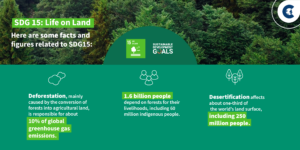In recent years, a revolutionary substance called Biochar has been generating considerable excitement in the scientific and environmental communities.
Biochar is a substance closely resembling charcoal and possesses remarkable properties that hold immense potential for carbon storage, enhanced soil and tree health, and amplified crop yields for farmers. It is also captivating environmental researchers and innovators concerned about mitigating climate change.
Biochar systems have the potential to absorb a significant amount of greenhouse gas emissions globally. Biochar initiatives could lead to a reduction of about 3.4 to 6.3 billion metric tons of carbon dioxide equivalent (PgCO2e). A potential superpower in our fight against global warming!
Due to its exceptional carbon stability, Biochar is emerging as a highly promising solution in the fight against climate change. We know that trees absorb carbon dioxide from the atmosphere and store it within their biomass. However, when wood is transformed into Biochar, the carbon attains remarkable stability, ensuring that when it is buried in the ground, it remains securely sequestered for hundreds to thousands of years.
The growing interest in Biochar stems from its remarkable potential to address numerous environmental challenges while offering several benefits. The Enfield Biochar Project which can be supported on our Marketplace, located in Maine, USA is one such initiative, involving the construction of a Biochar pyrolysis pilot facility. This article explores the concept of Biochar and why it is being referred to as a carbon gamechanger.
What is Biochar?
Biochar is a form of charcoal created by heating biomass, such as agricultural waste, wood chips, or crop residues, in a low-oxygen environment through a process called pyrolysis. Pyrolysis occurs at high temperatures, typically ranging from 350 to 700 degrees Celsius, which drives off volatile compounds, leaving behind a stable carbon-rich product known as Biochar.
The Importance of Biochar in Agriculture
Current agricultural practices are depleting soil nutrients and diminishing levels of organic matter through repeated crop harvesting. To combat this depletion, the prevailing solution involves the application of soil amendments in the form of fertilizers. Biochar may be added to soils to improve soil health, improve soil fertility, sequester carbon and offer a waste management solution.
Carbon Sequestration: One of the primary reasons why people are excited about Biochar is its immense potential for carbon sequestration. Biochar is rich in carbon and has a significantly longer residence time in soils compared to other organic matter. When incorporated into agricultural soils or used as a soil amendment, Biochar sequesters carbon, helping to mitigate climate change by reducing atmospheric carbon dioxide (CO2) levels.
Reforestation and Soil Health: Biochar is renowned for its ability to enhance soil health and fertility. Its porous structure and high surface area create an ideal habitat for beneficial microorganisms, allowing them to thrive and improve soil quality.
Enhanced Crop Yields: By incorporating Biochar into crop fertilization practices, farmers can achieve higher yields without relying on costly and potentially harmful alternatives. This results in increased crop production, allowing farmers to expand their sales and boost their overall revenue.
Waste Management: Biochar offers a compelling solution to the global challenge of agricultural and organic waste management. Instead of burning or landfilling biomass residues, which can release harmful gasses and contribute to pollution, these materials can be converted into Biochar.
New Source of Income: Farmers can now tap into a new potential source of income by selling waste materials and pruned wood from their cultivated forests for the production of Biochar. As the farmers’ forests continue to grow, selective harvesting and pruning of trees allow the remaining ones to thrive, accumulating more carbon. This presents a viable option for Biochar production, enabling farmers to generate additional revenue.
Potential Drawbacks of Biochar
While Biochar offers numerous potential benefits in agriculture, it is essential to consider its potential drawbacks to make informed decisions and mitigate any adverse effects. Addressing challenges related to cost, long-term effects, nutrient imbalances, environmental concerns, and regulatory frameworks will contribute to the sustainable and responsible utilization of Biochar. Continued research, technological advancements, and collaboration among stakeholders will help unlock the full potential of Biochar while minimizing any potential drawbacks.
The Future of Biochar
Now you can answer the question ‘What is Biochar’ and why it represents a remarkable opportunity to address pressing environmental concerns while offering numerous benefits across various sectors. While further research and technological advancements are needed to unlock its full potential, Biochar has already demonstrated its value in creating a sustainable and resilient future. With its ability to close the loop on organic waste, sequester carbon, and revitalize soils, Biochar has rightfully earned its status as nature’s black gold and we look forward to welcoming more Biochar projects on the ClimateTrade Marketplace.
Interested in learning more about carbon sequestration, reforestation or carbon offsetting projects? Head over to our Marketplace to discover more than 150 high-quality, verified environmental projects that you can actively support. Whether you’re representing a company or simply yourself, start today by reducing your carbon impact and helping us to create a healthier planet for all.

- SEO Powered Content & PR Distribution. Get Amplified Today.
- EVM Finance. Unified Interface for Decentralized Finance. Access Here.
- Quantum Media Group. IR/PR Amplified. Access Here.
- PlatoAiStream. Web3 Data Intelligence. Knowledge Amplified. Access Here.
- Source: https://climatetrade.com/what-is-biochar-natures-black-gold-and-why-are-people-so-excited-about-its-potential/
- :has
- :is
- a
- ability
- About
- Achieve
- across
- actively
- added
- Additional
- address
- addressing
- advancements
- adverse
- against
- Agricultural
- agriculture
- All
- allow
- Allowing
- already
- also
- alternatives
- amendments
- among
- amount
- Amplified
- an
- and
- answer
- any
- Application
- ARE
- AREA
- article
- AS
- At
- Atmosphere
- atmospheric
- BE
- been
- behind
- being
- beneficial
- benefits
- Billion
- biochar
- biomass
- Black
- boost
- burning
- by
- called
- CAN
- captivating
- carbon
- carbon dioxide
- Carbon Sequestration
- Celsius
- challenge
- challenges
- change
- Chips
- Climate
- Climate change
- Close
- closely
- co2
- collaboration
- combat
- Communities
- company
- compared
- compelling
- concept
- concerned
- Concerns
- Consider
- considerable
- construction
- continue
- continued
- contribute
- converted
- Cost
- costly
- could
- create
- created
- Creating
- crop
- decisions
- demonstrated
- depleting
- diminishing
- discover
- drawbacks
- drives
- earned
- effects
- emerging
- Emissions
- enabling
- enhance
- enhanced
- ensuring
- Environment
- environmental
- environmental concerns
- Equivalent
- essential
- exceptional
- excited
- Excitement
- Expand
- explores
- Facility
- farmers
- fight
- For
- form
- Forward
- frameworks
- from
- full
- further
- future
- GAS
- generate
- generating
- Global
- Globally
- Gold
- greenhouse gas
- Greenhouse gas emissions
- Ground
- Grow
- Growing
- growing interest
- harmful
- Harvesting
- Have
- Health
- healthier
- help
- helping
- High
- high-quality
- higher
- highly
- hold
- However
- HTTPS
- Hundreds
- ideal
- immense
- Impact
- importance
- improve
- in
- Income
- Incorporated
- incorporating
- increased
- informed
- Initiative
- initiatives
- innovators
- instead
- interest
- into
- involving
- IT
- ITS
- Know
- known
- lead
- learning
- leaving
- levels
- located
- long-term
- longer
- Look
- Maine
- make
- management
- Management Solution
- marketplace
- materials
- Matter
- max-width
- May..
- metric
- minimizing
- Mitigate
- mitigating
- more
- Nature
- needed
- New
- now
- numerous
- numerous benefits
- of
- off
- offer
- offering
- Offers
- on
- ONE
- ones
- Opportunity
- Option
- or
- organic
- Other
- our
- over
- overall
- People
- pilot
- planet
- plato
- Plato Data Intelligence
- PlatoData
- Pollution
- potential
- potentially
- practices
- presents
- pressing
- primary
- process
- Product
- Production
- projects
- promising
- properties
- quality
- question
- ranging
- reasons
- recent
- reducing
- reduction
- referred
- regulatory
- related
- release
- relying
- remaining
- remains
- remarkable
- Renowned
- repeated
- representing
- represents
- research
- researchers
- resembling
- resilient
- responsible
- Results
- revenue
- revolutionary
- Rich
- sales
- scientific
- Sectors
- securely
- selective
- Selling
- sequestration
- several
- significant
- significantly
- simply
- So
- soil
- solution
- Source
- Stability
- stable
- stakeholders
- start
- Status
- stems
- storage
- store
- structure
- substance
- such
- superpower
- support
- Supported
- Surface
- sustainable
- Systems
- Tap
- technological
- than
- that
- The
- their
- Them
- These
- this
- thousands
- Thrive
- Through
- time
- to
- today
- tons
- transformed
- tree
- Trees
- typically
- unlock
- us
- USA
- used
- value
- various
- verified
- viable
- volatile
- Waste
- we
- welcoming
- What
- What is
- when
- whether
- which
- while
- why
- will
- with
- within
- without
- wood
- years
- yields
- you
- Your
- yourself
- zephyrnet












